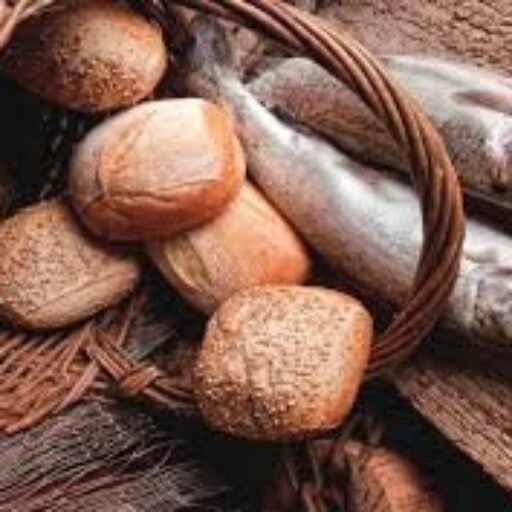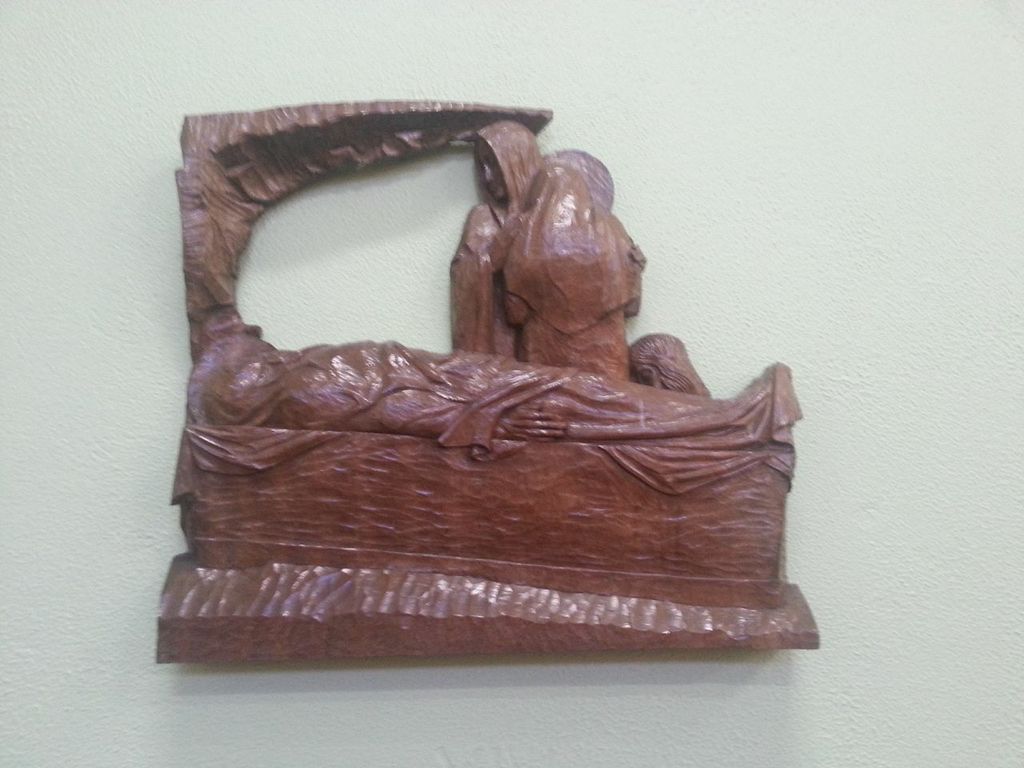
by Vincent | Mar 23, 2015 | General Interest, Reflections, Religion, Stations of The Cross
We adore you, O Christ, and we praise you. Because by your holy cross you have redeemed the world.
They wondered, as they walked, who would roll the stone away? He’d been lying there into the third day. They knew they’d come back to do what time denied them on Friday – anoint and reverence the body. It was the decent thing to do and you’d expect nothing else from decent people. The big stone though, that would be a problem. It seemed so final when it was rolled back over the opening of Joseph of Arimathea’s grave. It did more than seal the opening, shut out the light and enclose the body of Jesus. It seemed to say “day is done” and the end has come. There was sadness beyond measure as the stone sealed the opening and his fate. He was gone.
There was unfinished business though and they weren’t prepared to leave it unfinished. The stone though was a problem “Who would roll it away?” “How could it be rolled away?” A real dilemma and a practical problem.
The stone, it seems to me, represents grief. Grief, that block to peace – that which needs to be recognised and respected in order to meet it in some way that might lead to a better place. It may well seem too much for us and completely overwhelming. Chances are we might think the light will never shine again and that there is only darkness to follow. Bright days, happy days can become a faded memory in the face of grief. Questions asked, answers not found, loneliness, anger, disappointment – hurt are all to be found in the shadow of grief. Talk about days gone, memories shared have to suffice in the absence of the one gone. It’s an awful place to be. All the “sorry for your troubles” have been spoken, the prayers have been said, the grave has its day. Grief, that huge stone, is a cruel divide. The women wondered who’ d roll it away?
This station is for all going through grief. Jesus sleeps in death for all those who have died. His death is the gateway to new hope – new life and renewed hope. He is saying “I’ve been through this and it is not the end.” Life, as we’re told in one of the Prefaces for the Dead, is “changed not ended”. It does not seek to make little of the sadness felt or the loneliness being realised but still calls people to have faith and hope. Words spoken by Jesus should come to the surface “I am the resurrection and the life ….”, “The one who believes in me never dies ….” “I’m going now to prepare a place for you …..” “This day, you will be with me in paradise …” “The child is not dead, but asleep ….” These and other words like them seek to reassure us that the grave is not the end.
The stone, so talked about and worried about as the women walked towards the tomb was, in fact, rolled away. This “grief” cannot be allowed close out the light, the hope forever. One day, like the stone, it will be rolled away. Maybe it won’t happen in a single move but, bit by bit – chip by chip – the rolling takes place and the light returns.
We pray then for all going through grief -that they will one day round the corner and see the stone moved. On that day the light will return – this must remain our hope ……..
Oh, that today we would listen to his voice, let us harden not our hearts.
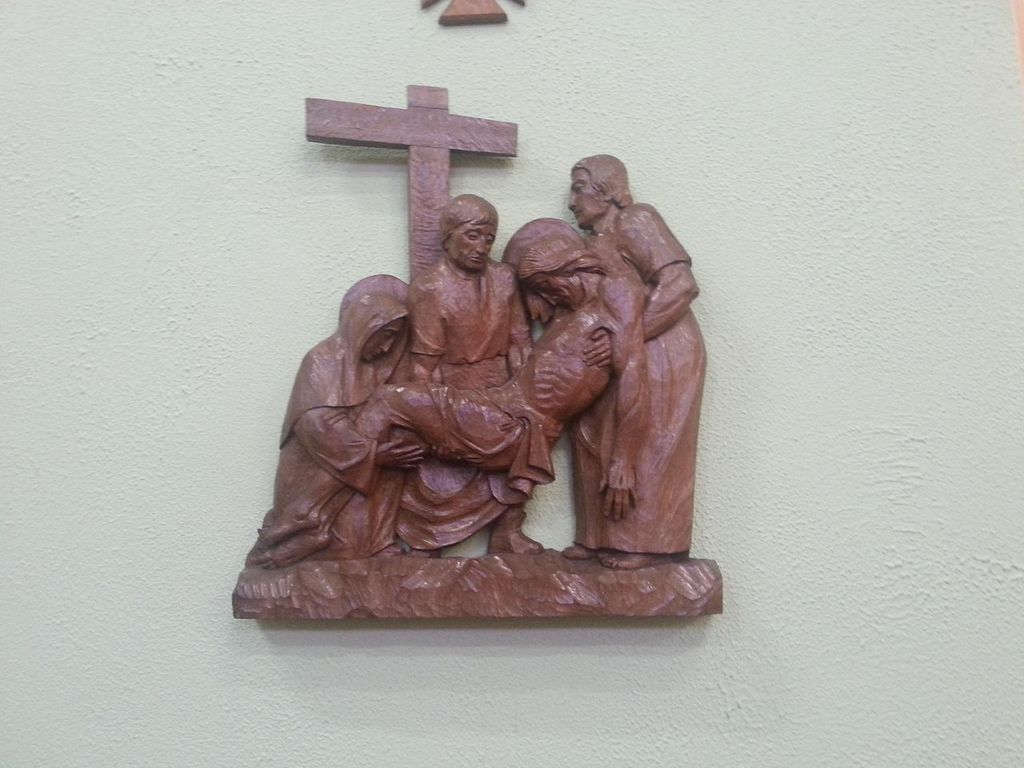
by Vincent | Mar 22, 2015 | General Interest, Reflections, Religion, Stations of The Cross
We adore you, O Christ, and we praise you. Because by your holy cross you have redeemed the world.
I can still see her. She’d been in the hospice for some time, off and on, but her final weeks were spent there – in a borrowed room. Her family tried so hard to make it their home and to make home of it for her. Familiar bits and pieces, photos of happier days, some of the food she liked – those everyday things that make something of life for us as we journey along. She knew, it seemed to all, more than she pretended and she moved along this uninvited path, surrounded by those who loved her most, knew her best and wanted – more than anything – to see her beat the odds, defy the diagnosis and enjoy what was her real home for many more years. “Ah, hello”, became her greeting of choice when anyone would walk into her room. There was a real effort in her intonation. She wanted to sound bright and in tune so that the tone would be set for all who came to see her. It was a wish, on her part, that despite all that was happening within and around her, people would be drawn into what was bright and in tune.
The last time we met was almost in total silence. I thought she was asleep or maybe even more deeply at rest in her own self and decided that I should celebrate with her, in quietness, the Sacrament of The Sick. I prayed the words, so low that there wasn’t even a whisper and when I reached to put the Oil on her forehead, she turned her two hands over – inviting the Oils to be placed on her palms. She knew what was happening and responded with open hands. When I finished, she looked up and said “you’re so good”. It was the most amazing “Amen” I’ve ever heard. Without formalising it, she said her “AMEN” – her so be it, in a way that was deeply spiritual and wholly appropriate. Her “amen” was gratitude and acceptance.
Hours, rather than days later, there followed her final Amen. I wasn’t there but those who mattered most to her were. I often think of the slowness of the moment, the reality dawning that her time had come and then there followed the disconnection of medical companionship for the journey – monitors perhaps – since they were no longer needed. Drawing near to her, was family and beyond them friends and neighbours, all working together to remove her from the cross – to take her, not so much down, as home and to want to walk that road with her. I hear again Jesus’ words at the eleventh station; “it is accomplished”, head bowed, spirit given – all that was left was for the right thing to be done by and for her.
I sometimes think that the Irish are especially gifted in the way they tend to one another at times like this. Other people’s houses, kitchens and lives are invaded by a wave of practical kindness that helps take people from the Cross. I’d hate to think we’d ever lose that. No financial bailouts, no economic downturns or negative equity, should ever stop us wanting to reach to the one on the cross and those standing at its foot, so that we can help – that we can carry – that we can give rest to the ones gone and loving support to those left behind.
You’d almost think Joseph of Arimathea must have Irish relations ….. even if he hadn’t, he did the right thing.
Oh, that today we would listen to his voice, let us harden not our hearts.
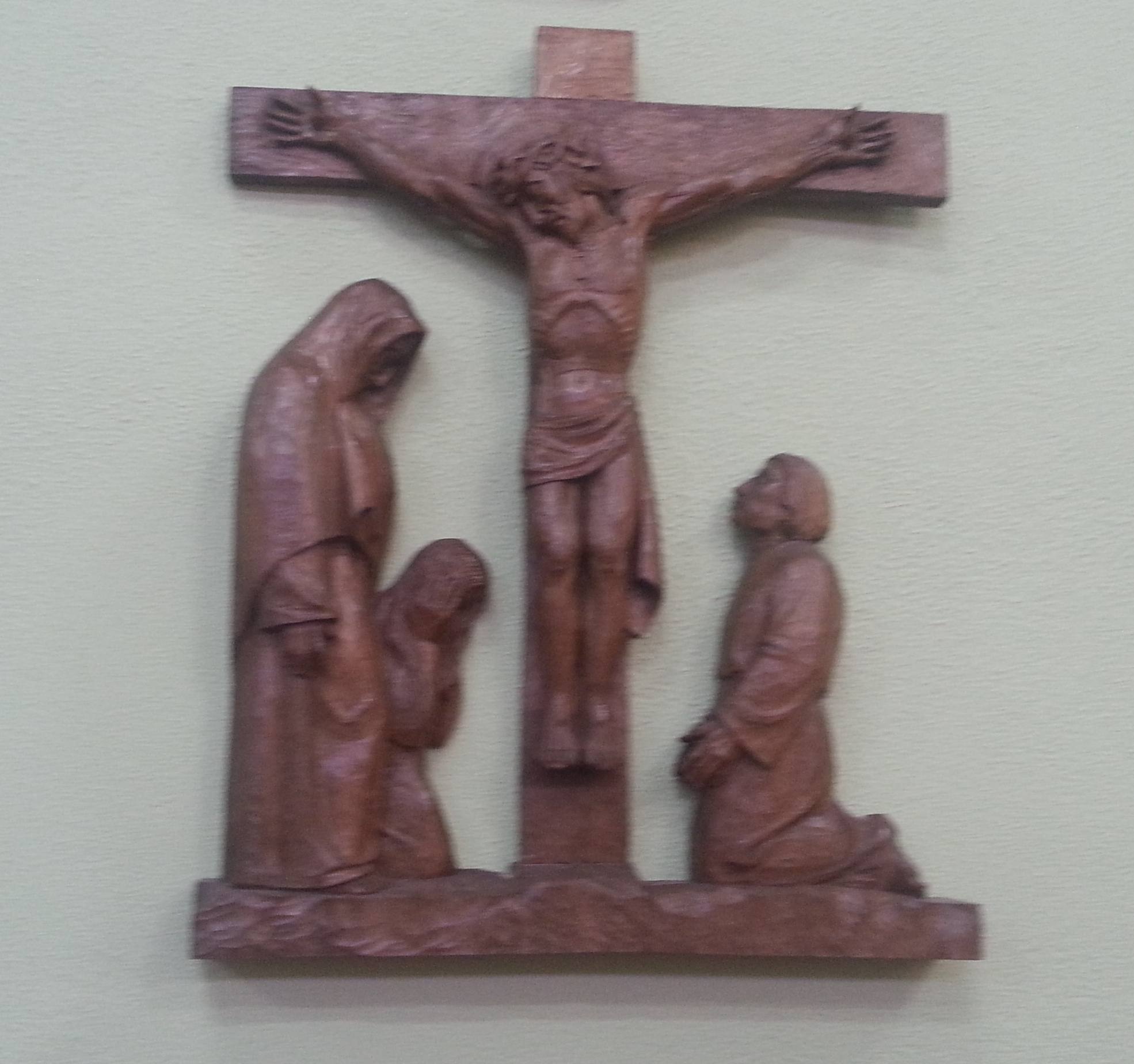
by Vincent | Mar 21, 2015 | General Interest, Reflections, Religion, Stations of The Cross
We adore you, O Christ, and we praise you. Because by your holy cross you have redeemed the world.
“How did it happen?” “Had he been sick for long?” “Did he say anything to you?” – these questions are fairly typical and often asked following someone’s death. It’s not so much about nosiness as trying to fit the pieces together so that there’s a completeness around the story of someone’s life and death. When a person dies alone or in strange circumstances there can remain a lot of unanswered questions. These questions can weigh heavily on the minds and hearts of those left behind. The “if onlys” can take hold and the grieving process is delayed or suspended in the absence of answers.
Jesus’ death is very public. Its details are recorded and have been re-told for over two thousand years. The story-tellers have changed but, in the main, the account of the death of Jesus has gone unaltered. It includes a prayer of forgiveness for those involved in the execution, a conversation with a repentant thief, the entrusting of his mother to the care of his beloved disciple, a heart-rending cry to God “Why have you deserted me?”, a call for a thirst to be quenched and finally an acknowledgement “it is accomplished”. Following that, a lowering of the head and yielding of the spirit.
These details are important and call us to a relationship with the Lord, even at the moment of his death. There’s a unity here that speaks to the hearts of all who have grieved the loss of a loved one. Somebody once said that the only way to never cry at a funeral is to never love anyone. Thankfully there are very few of us who can say we’ve never loved ANYONE so it’s fair to say, we’ve done our share of crying at funerals.
Is there a tear in our eye as we think about this station? Chances are there should be.
Oh, that today we would listen to his voice, let us harden not our hearts.
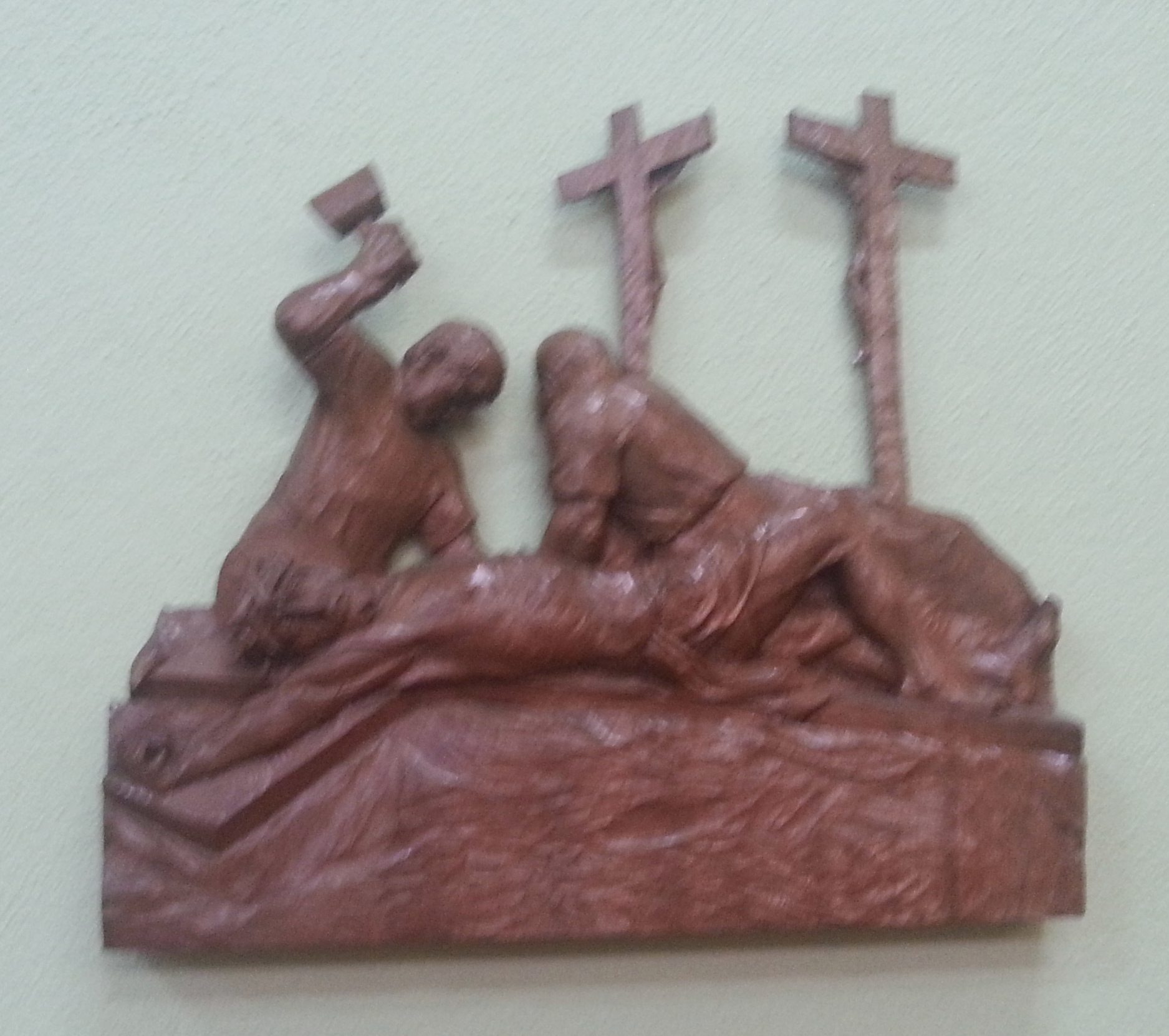
by Vincent | Mar 20, 2015 | General Interest, Reflections, Religion, Stations of The Cross
We adore you, O Christ, and we praise you. Because by your holy cross you have redeemed the world.
There are a few thoughts that come to mind when looking at this station – many thoughts indeed – but two that seem to re-emerge. One is of people living with disability, old age or infirmity. Their hands and feet quite literally tied and unable to move due to one condition or other. Jesus’ hands used to healing are rendered powerless beneath the enforced control of the nails. Likewise his legs and feet that walked to so many places and into the lives of so many people – from the young newlyweds in Cana to the bedroom of the a young child lying in but to be drawn from the arms of death. Hands that blessed, cured, nourished – feet that walked for many – rendered powerless. This station, I sometimes think, speaks to those who feel so restrained. Jesus seeks to focus them and all of us on what is central “Father, into your hands I commend my Spirit”. It’s as if he’s saying the body is a passing thing and that, in the passing, many changes take place but that the Spirit is the central. It is on the Spirit we must focus and IN the Spirit we must seek to come before God.
A second thought from this station focuses on what leads to cruelty between people. How could any man, even a solider obeying orders, use hammer and nails to inflict pain on another? The hammer and nails, in the right hands of a well-intentioned man or woman are tools of mending and creating. The tools of the trade and the trade is honourable. In the wrong hands, they are weapons – used to instill fear and to exert control. The hammer and nails, in and by themselves, can harm nobody. It’s when they’re put in the wrong hands the story of cruelty emerges.
As we look then at this station, we might do well to give a bit of thought to the potential for use or misuse of tools, even of weapons. Maybe too, we could make a firm resolve for peace. It’s also an invitation to pray for peace and the ending of cruelty in its many forms.
Oh, that today we would listen to his voice, let us harden not our hearts.
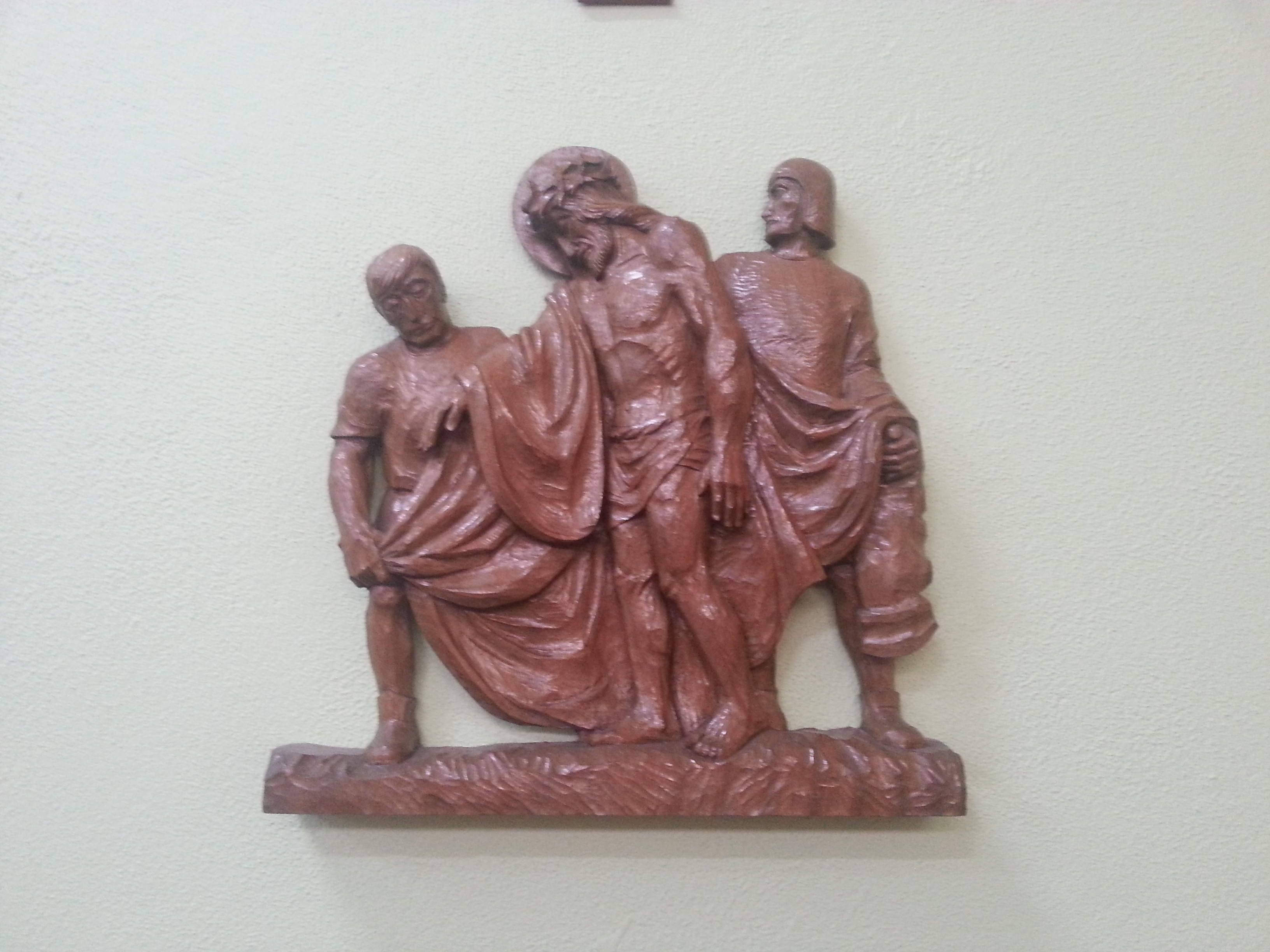
by Vincent | Mar 19, 2015 | General Interest, Reflections, Religion, Stations of The Cross
We adore you, O Christ, and we praise you. Because by your holy cross you have redeemed the world.
In many ways this is the cruellest of the stations – cruel in that it is so unnecessary. Who could possibly have wanted the garments he was wearing – bloodstained, sweat soaked, torn and destroyed? What was to be gained in taking them? The one who won the casting of lots for the seamless garment – what did he do with it? Quite likely it never made it beyond Calvary. That’s what so cruel about it – that it was beyond, way beyond what was needed. It was violation at its worst.
To take away what’s left to a person is wrong. Quite often the one thing we have in life that is unique to us is our name and ideally we can place the word “good” before that – our “good name”. There are times it may well be all that we have left. Yet, at times, it is taken too. Taken with vengeance and determination so that, like Jesus on the Cross, we are left emotionally naked with nothing to cover our shame, disappointment or brokenness.
What is it that drives people to the point of wanting to do this to another? Hate, you’d imagine, has to be at the core of such a choice.
Is it possible we need to feel the draft of nakedness ourselves and the vulnerability of losing what’s left to us before we can truly reflect on the need to leave others their dignity.
That “Golden Rule” pops up again, “treat others as you would wish them to treat you” …. It’s likely there’d be a lot less ripping, a lot less tearing, a lot less cutting if we allowed that sink in a bit more.
Oh, that today we would listen to his voice, let us harden not our hearts.
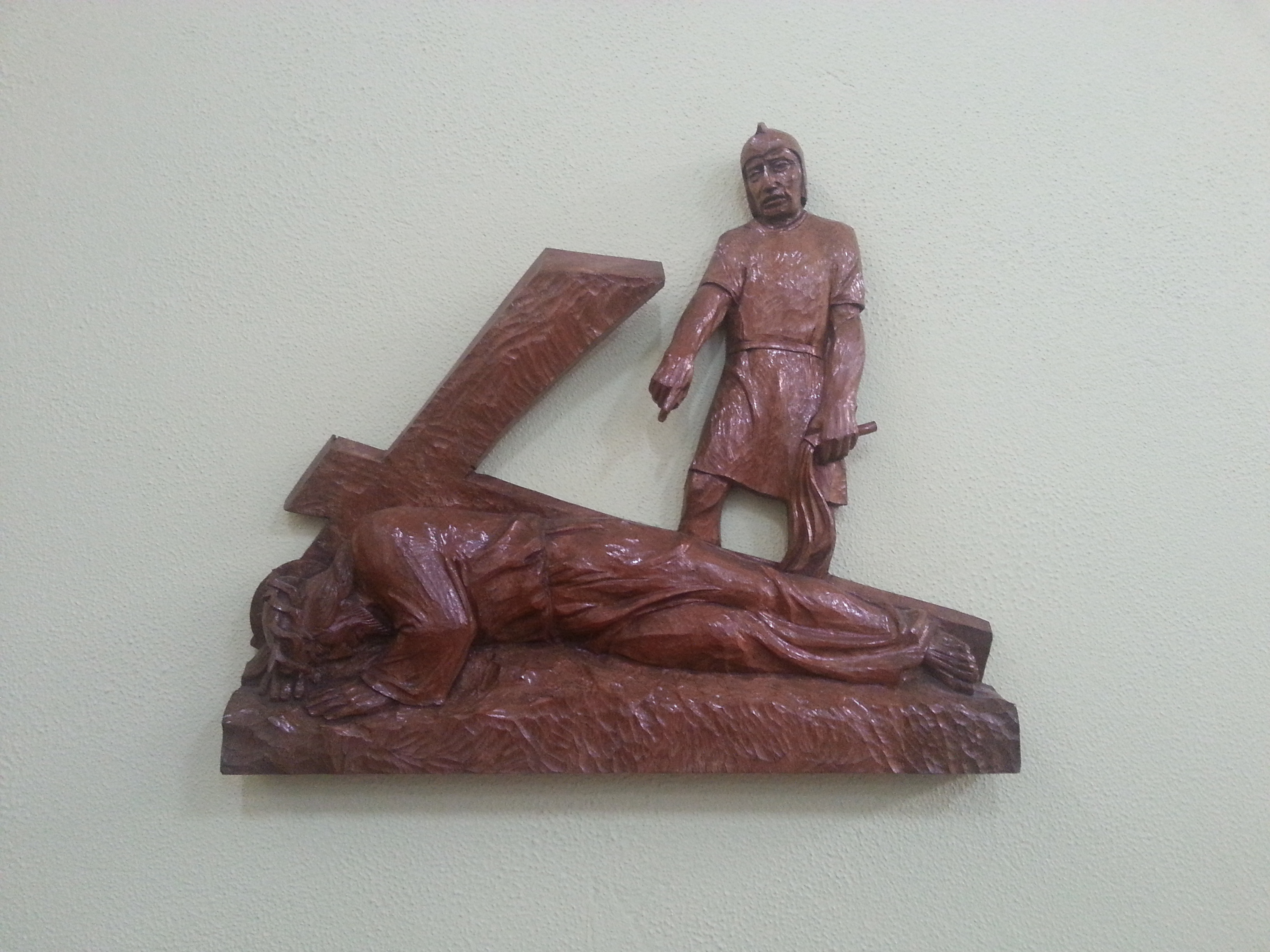
by Vincent | Mar 18, 2015 | General Interest, Reflections, Religion, Stations of The Cross
We adore you, O Christ, and we praise you. Because by your holy cross you have redeemed the world.
I mentioned before a priest called Fr Leo Morahan – I heard him speak one time about an elderly woman who used visit the church beside the school when he was a child. The children would go in to watch her as she prayed the Stations of The Cross. She’d not know they were watching since she was immersed in the journey she was making. She’d have no text book with her or no particular formula. She’d just walk from station to station, spend a while at one, a longer time at another – maybe say something, maybe not. He said that quite often at the ninth station she might say something like “you’re down again” …. simple but true.
“You’re down again”. That’s the truth of it. This station shows us the Lord stretched again beneath the burden of the Cross. Despite Simon’s help, the weight of the cross and tiredness of limbs lays him low.
This image of Jesus, though not easy to look at, speaks to the vulnerability in all of us. How quickly we can be laid low! How easily we can be broken! How ultimately fragile we all are.
“Fragile” – yeah maybe that’s the word. When something “fragile” is sent in the mail or by courier it usually has attached the simple but vital message “handle with care”.
Maybe this station is calling us to “handle with care” the humanity that is around us – the family, friends and neighbours around us. To do anything else could all too easily lead to their fall. To be handled any other way, likewise, to ours.
Oh, that today we would listen to his voice, let us harden not our hearts.

